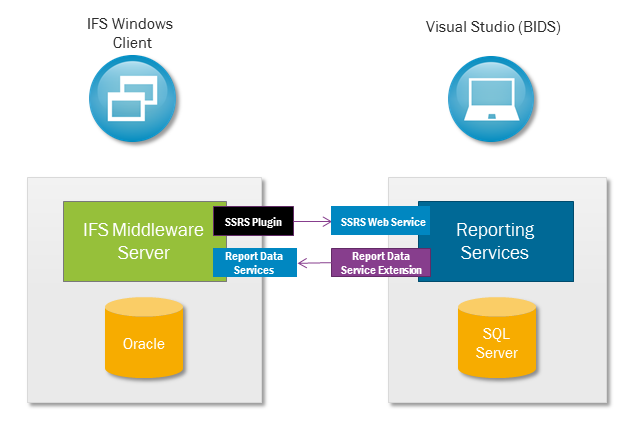

The middle tier implementation of the SSRS formatter is an internal implementation of an extended formatter plugin. Therefore a report plugin layout (RPL) is used to control the SSRS layout. Read more about the Extended Formatter Plugins here.
Data for the SSRS reports comes from the report data XML. SSRS integration is not dependent on the _REP views. Report data XML is exposed to SSRS Extension via the IFS Report Data Services. Read more about it here.
IFS SSRS integration introduces a new Microsoft Report Server Data Source
Extension. The reasons behind developing a custom IFS data source extensions can
be listed as follows.
1. Microsoft’s XML Data Source only works with Windows integrated authentication
or no authentication at all.
2. Microsoft’s XML Data Source requires “XML Query” or “Element Paths” which
require in-depth knowledge of the IFS data XML and knowledge of XML query
syntax.
3. Caching of the data is not controllable.
The
IFS Report Data Service Extension resolves the above concerns by providing the
authentication, data caching and simple data query capabilities. The RDF report
data collection, in other words the report data XML, is exposed as a serie of
Microsoft report datasets inside the MS SQL Server Reporting Services. The
datasets are cached to be reused by the returning request for the same result set.
The data found in a typical IFS report data XML can be categories into
four main areas.
1. Report Parameters – parameters used to order the report
2. Report column Translations and report texts
3. Report data – actual report data section
4. Repot meta data – information about the order report request (user
information, order time )
IFS Report Data Service Extension is capable of converting each of the above
mentioned sections of the report data XML in to MS SQL data set using a simple
queries. Data query contain two main parts the IFS operational report id, and
the data block of the xml. <REPORT_ID>: <BLOCK>. Some examples are listed below.
| Query Example | Description |
|---|---|
| PRODUCT_CATALOG_REP:PARAMETERS | All parameter data |
| PRODUCT_CATALOG_REP:TRANSLATIONS | All Translations data |
| PRODUCT_CATALOG_REP:DATA | Operational Data block |
| PRODUCT_CATALOG_REP:META | All Meta data |
In a Summery, the IFS Report Data Service Extension is aware of, IFS Instance
that it should retrieve the data from, the user credentials to connect to IFS, a
query to get the data bock, and convert it to a Microsoft dataset.
The main data source in this integration, The "IFS Report Data Service Web services" is protected by basic authentication of the IFS Middleware server. Access to IFS Results are controlled by one time Token mechanism. A token is generated in the start of the SSRS request process and its passed along with the SSRS formatting request to be used by the IFS Report Data Service Extension to authorize against the IFS web service that retrieves data. The whole Security token mechanism is built in to the SSRS integration and not specifically visible to outside and it doesn't require any configuration to be done.
Development of the SSRS reports is done using the Microsoft BIDS Studio for
Visual Studio and with the use of the IFS Report Data Service Extension. IFS
Report Data Service Extension can be installed using the F1 Tools Installer.
When developing SSRS reports, the user will have to have access to a result set
in IFS that can be used for previewing. This report must be distributed to the
actual user logged in to SSRS. But at runtime, the built-in user IFSPRINT will
execute all reports and use a special method for authenticating and
impersonating the end user. A detailed example can be found in the end of this
documentation.
Runtime configuration of the SSRS integration consist of setting up a
Microsoft SQL Server Reporting Server setup which is quite similar to a IFS BI
configuration. Read more about IFS BI Reporting Server setup
here. Install IFS Report Data Service Extension from the BI Extension
Installer along with the Authentication Extensions. In the IFS installation setup the
access point and user
credentials of the MS SQL SSRS server needs to be given. Please read more about
the Installation
here.
See this example of creating a basic Crystal Report to learn how to develop a simple Crystal Report that can be used to replace the Report Designer layout for a operational report in IFS Applications.